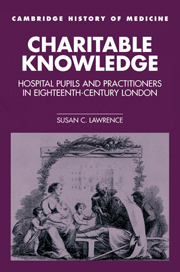Book contents
- Frontmatter
- Contents
- List of tables and figures
- Preface
- 1 Introduction: Hospital medicine in eighteenth-century London
- PART I INSTITUTIONS AND EDUCATION
- PART II COMMUNITY AND KNOWLEDGE
- Conclusion
- Appendix I London hospital men, 1700–1815
- Appendix II London hospital pupils, 1725–1820
- Appendix III London medical lecturers, 1700–1820
- Index
- Cambridge History of Medicine
1 - Introduction: Hospital medicine in eighteenth-century London
Published online by Cambridge University Press: 07 May 2010
- Frontmatter
- Contents
- List of tables and figures
- Preface
- 1 Introduction: Hospital medicine in eighteenth-century London
- PART I INSTITUTIONS AND EDUCATION
- PART II COMMUNITY AND KNOWLEDGE
- Conclusion
- Appendix I London hospital men, 1700–1815
- Appendix II London hospital pupils, 1725–1820
- Appendix III London medical lecturers, 1700–1820
- Index
- Cambridge History of Medicine
Summary
Were I to guess at the most probable future improvements in physic, I should say, that they would arise from a more general, and more accurate examination of diseases after death. And were I to place a man of proper talents on the most direct road for becoming truly great in his profession, I would choose a good, practical Anatomist, and put him into a large hospital to attend the sick, and dissect the dead.
So wrote William Hunter, surgeon turned physician, in an introductory lecture for his London anatomy class in the early 1780s. Hunter made a nicely prescient guess about the direction of progress in medicine. Read with the benefit of hindsight, his comment evokes the juncture of three paths into the “direct road” to medical modernity. First, Hunter pointed to an empirical methodology for “improvements in physic” that detached the investigation of disease from patients' experiences of illness and from direct concern for treating it. A newly conceptualized medicine started at death, when the bedside-practitioner gave up and the scientist-practitioner took over – and these were the same person. Second, Hunter placed his man in a hospital where he had equal power “to attend the sick” and to “dissect the dead.” Casting the hospital as an institution where practitioners deployed new methods to produce new knowledge transformed an expression of charitable care and social concern into a foundation for professional medical authority.
- Type
- Chapter
- Information
- Charitable KnowledgeHospital Pupils and Practitioners in Eighteenth-Century London, pp. 1 - 30Publisher: Cambridge University PressPrint publication year: 1996

